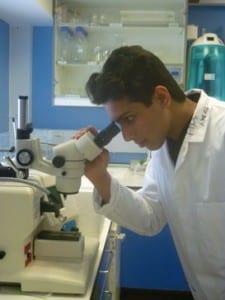Celebrating science outreach success
By news editor, on 28 August 2012
![]() Written by Rebecca McKelvey, founder of in2scienceUK
Written by Rebecca McKelvey, founder of in2scienceUK
On Wednesday 22 August, the 2012 in2scienceUK cohort came together at Teachfirst’s offices in London Bridge to celebrate this year’s science placements.
The UCL-inspired scheme, now in its third year, brings together outstanding AS science students from the poorest schools in London with research scientists, for a summer placement where they can experience research science first hand. During the evening, everyone at the event found out more about why the programme exists.
Why do we need this scheme?
While just 7% of children in the UK attend private schools (Source: The Good Schools Guide), they represent 48% of those going to the most prestigious selective Universities. In comparison, just 2% of those on free school meals attend those universities, illustrating the huge distinction between the ‘haves’ and the ‘have nots’.
During the evening, we heard from Abrahim Ahmed from Leyton Sixth Form College, who was one of 68 students to have a placement this year. He said:“Carrying out lab experiments at UCL with Dr Frances Edwards was a truly inspiring experience. I learned about the brains of Alzheimer’s disease patients and how to carry out in vitro electrophysiology patch clamp recordings, which really cemented my interest in science. I cannot wait to go to university to study a bioscience degree”.
The aim of the scheme is to increase the number of socio-economically disadvantaged students going to study research intensive science degrees at top Universities. Able pupils from deprived backgrounds, who are attending schools in challenging areas, face major obstacles when pursuing their interests in science – which contributes to the lower representation of this group in obtaining places at top universities.
This is reflected in a research report by the Sutton Trust (2010) which indicates that 96% of students from independent schools progress onto university, with just 16% of students eligible for free school meals accomplishing the same thing.
It is evident that students from more advantaged backgrounds often have access to contacts which can arrange placements and offer good advice and support. This scheme aims to mobilise science communities to equip these students with the skills and knowledge to put them on a more level playing field. This then enables them to compete for the best degrees at the UK’s top Universities.
Has the scheme been a success?
In 2010, 100% of those on the scheme are now studying at top universities, while initial figures from the 2011 cohort suggest that 95% of the 2011 cohort will follow them this October.
Professor Helen Roberts (UCL Institute of Child Health) has had a placement student for the past two years. Speaking at the event, she said:“This is a fantastic scheme which enables us to inspire the next generation of young budding scientists and to give young people who do not have many opportunities an experience which will really help them in the future”.
Already, over 100 young people from 35 different London schools have benefited from the scheme and, with over 300 applicants a year, in2scienceUK is growing in popularity with plans to expand to Bath, Liverpool and Nottingham from Summer next year.
Image: Abrahim Ahmed from Leyton Sixth Form College, who had a placement with Dr Frances Edwards (UCL Neuroscience, Physiology & Pharmacology)
Links:
In2science UK
 Close
Close


